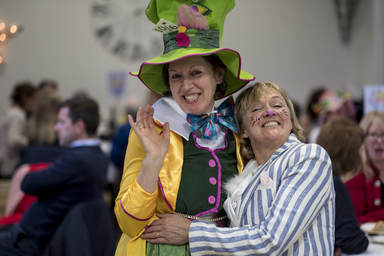 by Shirley Cherry, voluntary fundraiser Scores of scones, dozens of dollops of jam, cream by the jug load and that’s before any mention of sandwiches and cakes. Ninety-four teas were served over two sittings at The Chapel, Oxhill, Warwickshire on Mothering Sunday 11th March. Plus, a great time was had by all! Thanks to all the cake bakers, musicians, our fabulous face painter, our young Wonderland waiting staff, kitchen caterers and tea-cup washers-up; White Hyacinth Cake Design for the fabulous Mad Hatter Cake, Cotswold Marquees for loaning the tables, Rev Jill Tucker for the use of The Chapel, Clearway Promotions for sponsoring the print and everyone who helped to make the Mad Hatter’s Tea Party such a success. It was all rather WONDERFUL and a great example of how a local community can pull together to support a good cause, albeit in a distant, faraway land like The Gambia. Between us we raised the fabulous total of £1,437 for the African Oyster Trust. Particular thanks go to St Mary’s Church Tysoe for its very generous £250 donation (offered as match funding). The money raised will be used in the Gambia to support the work of the Trust. One of the first jobs will be to replace the roof of Jappineh Health Centre as the last one has been eaten by termites! The plan is for the director, Lady Kira Dalton, to give a talk in Tysoe about the latest projects when she returns to the UK during the Gambian rainy season. Watch this space for more details. All of which just goes to show that a touch of MADNESS can pay! Once again thanks for all your generosity, time and efforts.
0 Comments
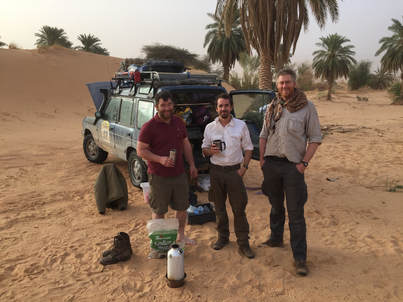 It was June 2017 when Tor Peebles contacted the African Oyster Trust with a proposal. He and a couple of chums - Phil Caswell and Ben Dufley - were preparing to take part in a Trans-Saharan race from Europe to West Africa; an off-road endurance and navigational rally. Searching online, they had singled out the African Oyster Trust to donate their K Reg Land Rover Discovery 1 (aka the Gentleman’s Express) at the end of the rally. It all sounded a splendid idea. But when Kira realised that it wouldn’t be a left-hand drive vehicle (Gambia doesn’t permit the importing of right-hand drive cars) we thought: that’s that. However, Tor, Phil and Ben made sure that the Trust would benefit anyway, with help from the donations of their friends and admirers, via Just Giving. Here are excerpts from the last days of their rally log. 27th January 2018 A short 300ish Km day but with a whole plethora of activities to complete. After staying north of the Gambia River overnight we first had to cross south. With the overnight stop so close to the ferry we were in no real rush to head off. However, when we arrived at the small port we found a queue of about 15 vehicles. The ferry only takes four cars and with the queue consisting of vans and a couple of mid-size buses, we knew we’d be there for a while. Local children were pestering us to buy them footballs and give them money and this soon started to wear thin. The problem, we deduced, is that the children do the begging and teenagers then take anything you give or buy them and sell it - keeping the profits for themselves. This, we figured, has become very lucrative for the teens: professional begging! Since we arrived in Africa it has been a topic of debate in the car and what could be done locally to stop it, yet still allow a charitable vibe to persist. These children obviously aren’t starving and appear quite healthy. The mid-eighties fly-ridden pot-bellied version of Africa is no longer extant and as such the countries we passed through are thriving, in their own way but still thriving. Mobile phones are a huge part of daily life, as without the landline infrastructure they jumped from no telephone to mobile phones. Coupled with the low-tech approach to life, solar panels are not uncommon even in the smaller villages and settlements we passed through. So, as we sat in the queue for the ferry we decided to try and effect change, nothing too huge but something easily sustainable. Rather than just blindly give these little beggars what they wanted we would offer them a way of earning some money. As we had finished with the sandy and dusty areas, the car needed washing and a price was agreed of 200 Dalasis, the equivalent of around 4 Euros. To start them off I bought them a sponge and they set to work. After a quick lesson the car was wet, and the boys asked us to buy some Omo, local detergent powder. I said if they wanted some they could get an advance payment to allow them to buy their own. Soon the car was covered in bubbles and being meticulously rinsed. A good standard was achieved and, happy with the job, I handed over the remaining 100 Dalasis, making a total profit to split between them of 190. A fair profit for half an hour’s work. Our friends in car 60 also had theirs washed, allowing our budding monopoly holders to purchase their football and learn that this way they gained a lot more than simply begging. As we boarded the ferry the view behind us was of soap suds and smiles – already a good day by any measure. We soon arrived at Jappineh, the location of a small medical facility supported by our charity, the African Oyster Trust. Once inside the walled compound we were given a guided tour, starting with the outpatients’ area, a small room with a single bed for the consultation of patients. Then into the (thankfully empty) inpatients ward, suitable for 8 patients at any one time. Next, we visited the lab where samples could be checked against malaria and other ailments. A small stand-alone building has recently been erected as an isolation ward for sufferers of TB and a larger covered area with space to seat around 100 people and used for collective awareness classes. During our visit, Tor was midway through a 3-hour nose bleed and whilst not life threatening, the male nurse offered to help, eventually stemming the flow. Later in the day we headed for our overnight stop at Tendaba, another campsite with limited facilities but (increasingly important) a bar! The view stretched along a freshwater beach with breath taking views along the tidal Gambia River. At low tide the mangrove bushes with their roots exposed looked like a scene from an Attenborough documentary. Our penultimate day ends with everything we expected from this trip – wild African views, good friends, a campfire, and a few cheeky beers. 28th January 2018 Today we had a few hours tarmac drive to Banjul and the finish line. Excitement was high as we converged on Banjul, but first we needed lunch! We met Kira Dalton of the African Oyster Trust for a fantastic carvery lunch at a local restaurant, Samba’s Kitchen. It was wonderful to meet her and hear in a bit more detail how the Trust is helping in Gambia. We learned that the money raised through Just Giving will make a real difference and could for example cover the salary of a teacher for a year. The finish line was chaos and we crossed it with mixed feelings including relief, sadness, excitement… a hectic few hours followed congratulating our other rallyists. The awards ceremony was cracking and team 17, our British friends in the racing category, won a prize for the most sociable team of the rally. After this we retired to the bar to discuss the next trip. We are hugely grateful for the support from all in helping to raise money for the African Oyster Trust, such a valuable and worthy cause. Our friends and family also deserve massive thanks – supporting, encouraging and tolerating what must have seemed like a lunatic obsession that has dragged on forever! It has been an incredible journey – awe-inspiring and humbling. We have forged some great friendships and seen some unforgettable sights. Lastly, I hope that perhaps we have demonstrated that if we can do it, so can anyone! And it’s Madness Not To! The next rally is in 2020… A few more words about the African Oyster Trust from Tor Peebles:
“To reach The Gambia after thousands of kilometres driving across Africa evoked some good feelings. However, for us what really brought it all into context and made the experience unforgettable was the opportunity to meet some of the African Oyster Trust beneficiaries and understand a little about how the Trust operates, and the good work it does. "We were delighted to be offered the opportunity to stop in at the Health Centre in Jappineh and meet the staff – a place full of promise; providing much needed basic healthcare, and with aspirations to expand the maternity ward and improve facilities further. Of course, this clinic is just one of the many places that receives support from the Trust. "Meeting Kira the next day, we were heartened to hear how the Trust supports local projects and services that have a sustainable, long-term approach – ensuring any equipment / infrastructure / medicines etc. will be managed and looked after. "Rarely do you get to see first hand the effects of such charitable causes, and it was a hugely positive experience. For us I think it reaffirmed the value of the great work that the African Oyster Trust is doing, and it was certainly humbling to see." A huge thank you to Tor, Phil and Ben for their generous hearts and minds, and to all their supporters and fans who donated to the African Oyster Trust. We have received a very handsome cheque for £1,000. 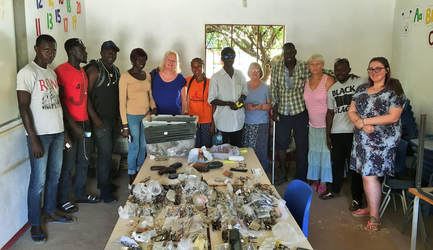 The eye-care team: Bev, 5th from left; Sue, 5th from right The eye-care team: Bev, 5th from left; Sue, 5th from right By Kira Dalton January - Eye Care My January visit was mostly taken up by helping with our annual Eye Care Programme, again ably conducted by Bev Breakwell and her sister-in-law, Sue Steel, from Warwickshire. We sight-tested over 160 patients in 1½ days, as well as seeing another 60 or so patients at Faraba Banta School en route. Everyone was examined by Bev, a qualified Optician, before Sue dispensed free second-hand spectacles, as required. Working with us on both days was the Senior Eye Specialist from Soma Hospital, Ebrima Jadama. Those who needed cataract or other eye surgery were immediately examined and scheduled for surgery with him the following week. For all concerned, it was an enormously productive and satisfying couple of days. ‘Drop the Cane and Chain Campaign’ goes from strength to strength February is the month for purchasing our annual drug requirements for the Health Centre in Jappineh, at Banjul Pharmacy. This year we spent over 320,000 dalasis (around 5,000 GBP). I’m delighted to report that a full half of this figure was raised by the Health Centre’s own sales of medicine during the previous year. Each year the staff aim to make the Health Centre more and more self-sufficient; their ultimate objective is a completely sustainable Centre, run by the community with no outside help. Banjul Pharmacy didn’t have some items in stock so further boxes were purchased from the Malik and Value Pharmacy wholesale divisions – 72,000 dalasis worth. All supplies are divided according to disease patterns and packed into cartons for collection each month. The rest are kept in an air-conditioned warehouse in Kotu. We took fifteen boxes in total, because supplies in Jappineh had run down following a busy few months. While I drove us there, Fanding Manjang was organising everything in advance by phone. With us were two experienced psychiatric nurses from the Tanka Tanka Psychiatric Hospital, Fatoumatta Jallow and Yankuba Suwareh. They would do the 3-day training session for our Health Centre Staff and for the Marabout's people [marabouts are traditional healers whose treatment includes herbs, canes and chains]. The nurses had been carefully briefed by Dawda Samba, who heads up the mhLAP for Gambia (mental health Local Advocacy Programme) run by the World Health Organisation (WHO). Dawda had personally conducted both initial training sessions of the ‘Drop the Cane and Chain Campaign’ (see previous reports). He and Fatou had also been among the monthly outreach visitors who go to the Marabout’s hospital (Njie Kunda) to check on medication, diagnosis, and the on-going care of their mentally ill patients.
We left Brufut before 7am and managed to get to Jappineh just after 10am, to make the most of our time there. The plan was to conduct half a day’s training in English at the Health Centre and then to repeat a simplified version, in Mandinka local language, at the Marabout's establishment after lunch. The photos here show the well-received sessions held at both locations, which are only some 500 meters apart. The highlight, for me, was the final session when both groups were brought together to discuss how best to prevent relapse and ensure good continuity of care when patients are discharged. There is already close collaboration with the Marabout’s team. They routinely call the Health Centre staff to come and see new admissions on arrival, when they conduct physical examinations as well as suggesting what drugs to administer. It has also been agreed that each patient will be given a record card detailing all their treatments (traditional and Western) and that the Health Centre staff will be notified when a patient is about to be discharged. This will ensure that the patients go home with sufficient medication, and that their family support will have been well-briefed. There is potential for follow-up home visits, and written records that can be shown to any other health facility they might need to visit in future. Our mutually agreed objective is now to minimize relapses and reduce the need for re-admissions. Major steps are being taken for mental health in this area of Gambia, as these smiles during training surely indicate. |
News DiaryThe News Diary is a regular account of all that is happening at The African Oyster Trust. Please pop back for regular updates, follow us on Twitter or sign up for our RSS feed to have the latest news sent straight to your computer! AuthorsThe news diary is written by a number of people close to the work of the African Oyster Trust, including founder James Holden, his co-directors, trustees and volunteers. Archives
February 2024
Categories
All
|





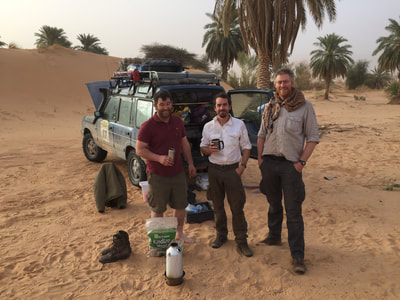
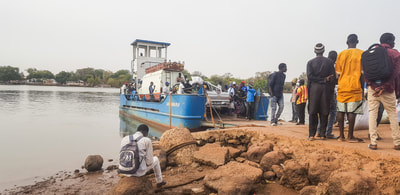
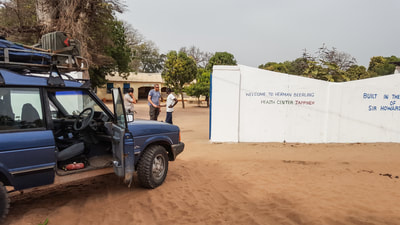
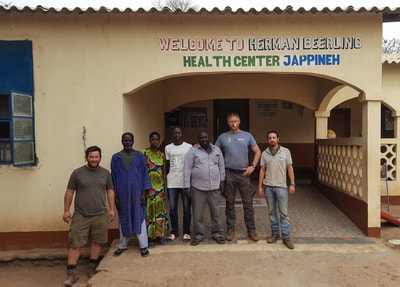
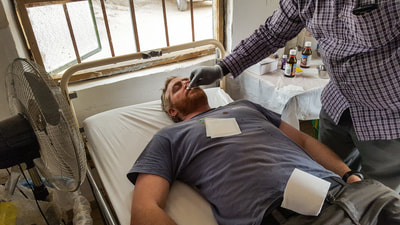
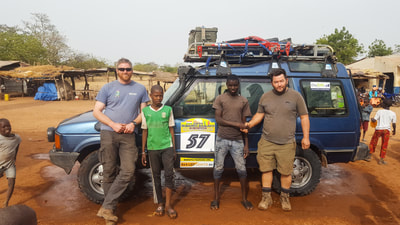
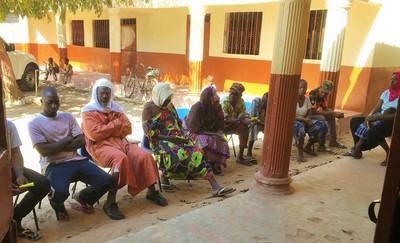
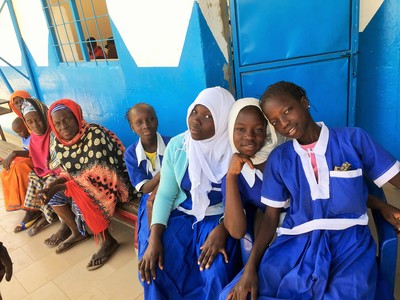
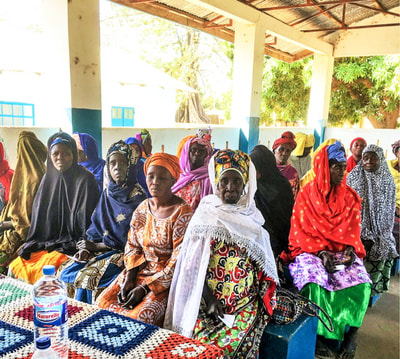
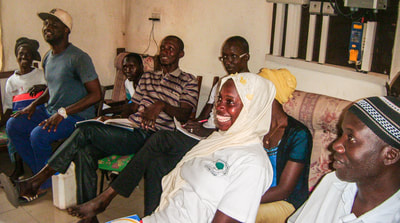
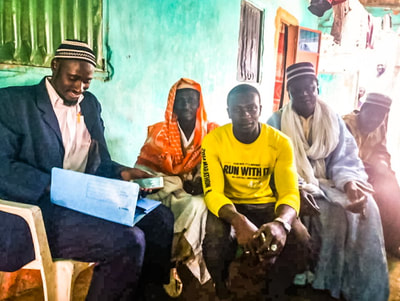

 RSS Feed
RSS Feed